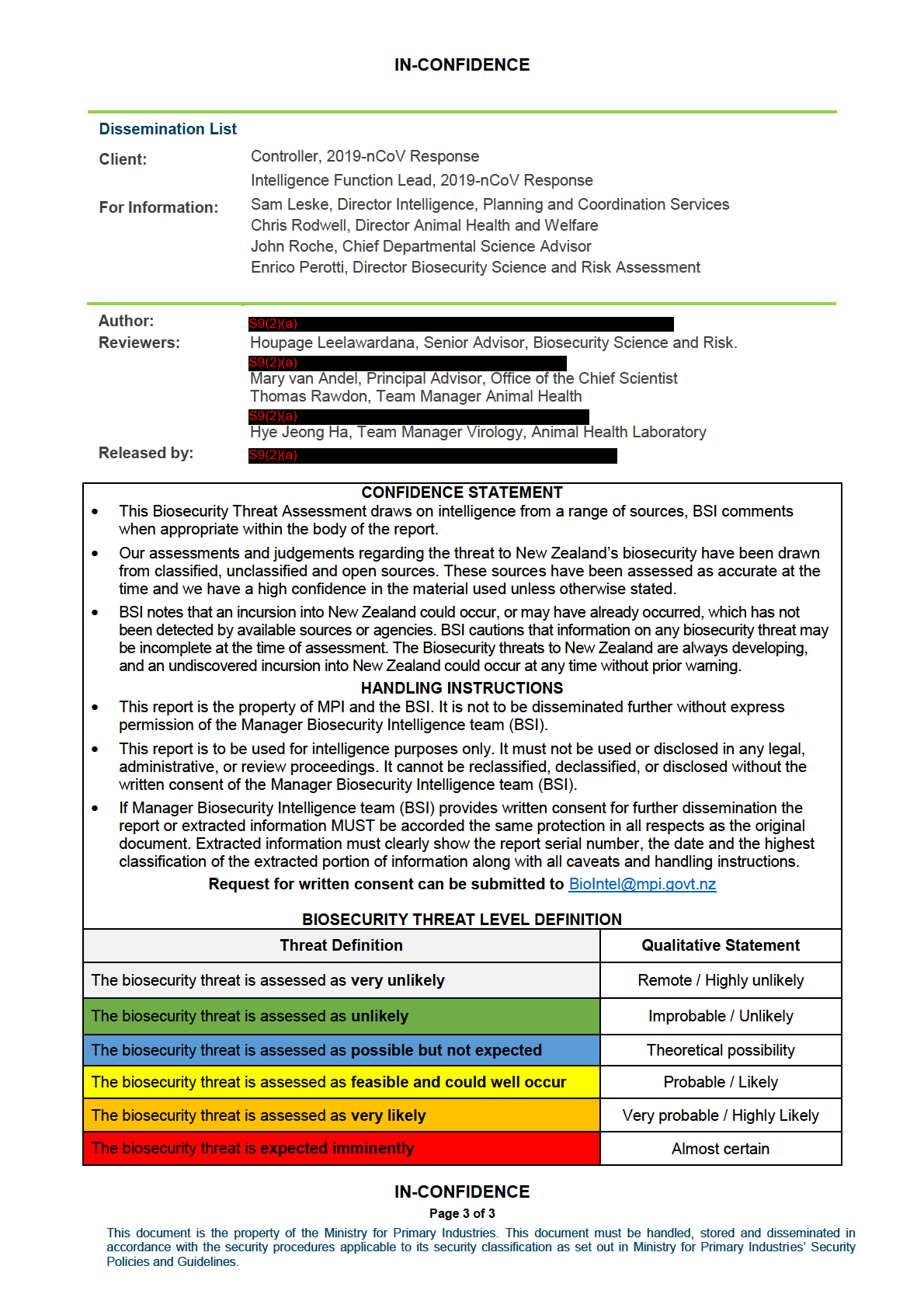
 IN-CONFIDENCE
INTELLIGENCE REPORT
IN-CONFIDENCE
INTELLIGENCE REPORT
Can COVID-19 infect domestic animals?
Released
5 March 2020
Controller, COVID-19 Response
To
Intelligence Function Lead, COVID-19 Response
1982
From
Biosecurity Intelligence team and Animal and Aquatic Science and Risk team
Key Judgments
ACT
Despite a recent report of a dog in Hong Kong testing ‘weakly positive’ for COVID-19 virus,
available information indicates that domestic animals are unlikely to become infected or transmit
the virus to humans.
– The reported test cannot distinguish between active infection and the dog passively
acquiring viral material from its environment. Only active infection would likely have
consequences for human or animal health.
– We have seen no evidence that dogs or other domestic animals are susceptible to COVID-
19 infection.
INFORMATION
Background
1. We recently assessed that domestic animals were unlikely to acquire and transmit COVID-19
virus (20200207 Domestic animals and 2019-nCoV.pdf).
1 Since then, a ‘weak positive’ test result
has been reported for a dog belonging to a COVID-19 patient in Hong Kong.
2 Our updated
assessment in light of this report is summarised below.
OFFICIAL
Assessment
Can dogs and other domestic animals become infected with COVID-19?
THE
2. We have seen no evidence that dogs or other domestic animals can be infected with COVID-19
virus. The result for the dog in Hong Kong refers to a testing procedure that detects viral genetic
material, but does not necessarily imply infection with viable virus.
3
The dog may have licked or breathed in viral material present in its environment, and be
carrying it passively without becoming infected.
UNDER
3. We have seen no further reports of positive COVID-19 tests for dogs or other domestic species.
We have seen no reports of domestic animals becoming infected or carrying viable COVID-19 virus.
4. Hong Kong authorities say the dog has no clinical signs and they have no evidence that pet
animals can be infected.
2,3 They are conducting further tests to determine whether the dog has been
infected or is passively carrying environmental contamination.
Can dogs and other domestic animals spread COVID-19?
RELEASED
5. It is highly unlikely that people can catch COVID-19 from domestic animals. We have seen no
evidence that domestic animals can be infected by the virus and spread it. Domestic animals carrying
environmental contamination would be unlikely to transmit viable virus back to humans.
IN-CONFIDENCE
Page 1 of 3
This document is the property of the Ministry for Primary Industries. This document must be handled, stored and disseminated in
accordance with the security procedures applicable to its security classification as set out in Ministry for Primary Industries’ Security
Policies and Guidelines.
IN-CONFIDENCE
Should domestic pets living with confirmed cases in NZ be tested for COVID-19?
6. There would be little benefit in testing pets living with people who have COVID-19 in NZ. The
tests currently available for domestic animals do not indicate infection or capability to spread the
virus.
Current tests would provide little or no insight into the risks to either humans or domestic
animals. Serological tests that would demonstrate COVID-19 infection are not yet available
for domestic animals.
1982
The OIE advocates further research into the susceptibility of domestic animals, to better
manage the human epidemic.
4 However, such research would best be undertaken in
controlled laboratory conditions, or alternatively, in a society with a large number of human
ACT
cases and associated animal exposure.
Ad hoc testing of a very small number of animals in
NZ would contribute little to this research.
Should domestic pets living with confirmed cases in NZ be put into quarantine?
7. There would be little benefit in quarantining pets living with COVID-19 cases in NZ. These pets
are unlikely to spread the virus.
While acknowledging there is no evidence of animal susceptibility, the World Small Animal
Veterinary Association and the USA’s Centers for Disease Control and Prevention
recommend that COVID-19 patients restrict their contact with pets, as a precautionary
measure until the virus is better understood.
5,6 Their advice is to minimise physical contact
INFORMATION
between the patients and their pets, and observe appropriate hygiene measures.
Conclusion
8. There is no current evidence that domestic animals can be infected by COVID-19 virus or
transmit it to humans. BSI and BSRA will continue to monitor COVID-19 and provide updates as
required.
OFFICIAL
References
1.
BSI/BSRA report, ‘Does the novel coronavirus that has emerged in China impact domestic animals?’
THE
Released 7 February 2020. 20200207 Domestic animals and 2019-nCoV.pdf
2.
Hong Kong Agriculture, Fisheries and Conservation Department press release, ‘Detection of low level of
COVID-19 in pet dog’. Dated 28 February 2020.
https://www.afcd.gov.hk/english/publications/publications press/pr2335.html
3.
OIE event report, dated 29 February 2020.
https://www.oie.int/wahis 2/public/wahid.php/Reviewreport/Review?page refer=MapFullEventReport&r
UNDER
eportid=33455
4.
OIE informal advisory group discussion presented to WHO Global Research and Innovation Forum,
‘Animal and environmental investigations to identify the zoonotic source of the COVID-19 Virus’. Dated
31 January 2020. https://www.oie.int/fileadmin/Home/eng/Our scientific expertise/docs/pdf/COV-
19/COVID19 21Feb.pdf
5.
World Small Animal Veterinary Association advisory document, ‘The New Coronavirus and Companion
Animals - Advice for WSAVA Members’. Dated 29 February 2020. https://wsava.org/wp-
content/uploads/2020/02/COVID-19 WSAVA-Advisory-Document-Feb-29-2020.pdf
6.
Centers for Disease Control and Prevention, COVID-19 Frequently Asked Questions. Dated 3 March
RELEASED
2020. https://www.cdc.gov/coronavirus/2019-ncov/faq.html#2019-nCoV-and-animals
IN-CONFIDENCE
Page 2 of 3
This document is the property of the Ministry for Primary Industries. This document must be handled, stored and disseminated in
accordance with the security procedures applicable to its security classification as set out in Ministry for Primary Industries’ Security
Policies and Guidelines.

1982
ACT
INFORMATION
OFFICIAL
THE
UNDER
RELEASED


